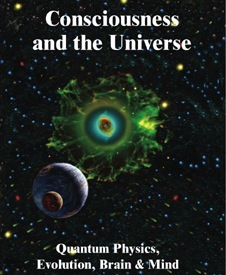|
|
|||||||||||||||
Journal of Cosmology, 2010, Vol 7, 1790. JournalofCosmology.com, May, 2010 Famed astrophysicist Dr. Stephen Hawking has voiced concern about the dangers, he believes, are posed by alien predators who may arrive in giant space ships, to conquer, enslave, destroy, colonize, and voraciously exploit the resources of Earth. According to Hawking:
11. Stephen Hawking Is Wrong. Earth Would Not Be A Target For Alien Conquest. Harold A. Geller, Ph.D., George Mason University, USA On 25 April 2010 Stephen Hawking was widely quoted as saying that our species should not try to talk to aliens (Leake, 2010). As detailed in the Abstract to these commentaries, Hawking is quoted as saying that ďif aliens ever visit us, I think the outcome would be much as when Christopher Columbus first landed in America, which didnít turn out very well for the Native Americans.Ē It should be noted immediately that there are several flaws in the Hawking analogy to the invasion by White men of the Americas. The motives of the invading Whites would be nothing like those of aliens who might contact Earth. European explorers and Native Americans, in the days of Columbus and today still, were of the same species, Homo sapiens sapiens, which consists of males and females. Inevitably, sexual relations were a natural consequence of contact, and which produced viable offspring. Furthermore, both have the same physical, chemical, mental and intellectual attributes which mark both as human. Aliens from another planet outside our solar system will most likely not be of the same species as that of Earth. Humans killing humans poses a decidedly moral dilemma (Washburn, 1957). Aliens killing humans, or humans killing aliens may also pose a moral dilemma, but then it may not. Humans kill for sport, and for access to resources. Competition for scarce resources leads to conflict. But would aliens, as Hawking's envisions them, be interested in the same resources which are of value to the humans of Earth? The probability that intelligent beings from another star system would share a common biology, chemistry, psychology and sociology with humans might be infinitesimally small. Therefore, it would be unlikely they would compete with humans for sex partners, as the biological purpose of sex is reproduction. If alien biology and chemistry is significantly different form humans, not only would they be unable to reproduce offspring with the humans of Earth, but they may not be interested in the same resources. For example, whereas humans consist of right handed sugars and left handed amino acids exclusively, such is not likely (p=0.25) to be the case with alien species assuming they use sugars and amino acids (Zubay, 2000). Would Hawking's aliens also use ATP as their cellular energy transfer molecule? Although this is not a determinable likelihood, but if not, then it can be assumed that Hawking's aliens would not be interested in preying upon and consuming humans or other animals or vegetable matter as an energy source. Why would an alien species bother with our cellular bodies? Furthermore, if the alien species has, as Hawking states ďused up all the resources from their home planet,Ē why bother to traverse interstellar space for these resources? The resources available to the alien species are much more likely to be available on other planets in the alienís home solar system, and can be acquired at a much reduced energy cost. But Hawking may insist that the aliens have used up all the resources in their starís system. However, if Hawking's aliens are sufficiently intelligent to exploit all sources of energy, including from their sun, wouldn't they also be intelligent or wise enough to plan ahead for the future so they do not consume all their energy sources? And if they did not plan ahead, how is it then they would have enough energy available to supply a fleet of giant space ships to travel across interstellar space to far away and distant planets? An expedition, or alien armada targeting Earth, also implies that the aliens knew years in advance that another star system exists which would be ideal for them. However, if that were the case, then they would logically immediately disperse an expedition to that star system and not use up their own systemís resources first. While this may be analogous to the colonization of the Americas here on Earth, the time required to cross interstellar space is not analogous to the time required to cross the Atlantic Ocean, even in 1492. This appears to lead to a circular reason for any space travel by such a civilization, and it ignores the energy requirements of space travel itself, which have long been known (McNutt et al., 2002). Research into the energy requirements of interstellar space travel has determined that energy efficient mechanisms must be developed which require at the very minimal, an energy equivalence to fusion reactors, or even better, anti-matter reactors (Crawford, 1990). Such energy efficient mechanisms for propelling space craft interstellar distances would likely be fueled by some form of hydrogen or one of its isotopes. This leads one to believe that the largest requirement of an interstellar alien species would be hydrogen or some isotope thereof. Why go to another star system just for hydrogen, the most abundant chemical element in the universe? It is simply not reasonable that such aliens would traipse about the galaxy just to pilfer the puny resources of a tiny planet laden with such heavy elements when it is the lightest most abundant gasses they would most likely require. As to the possibility Hawking's aliens might desire heavy metal elements such as would be found on a planet like Earth, these same elements could be produced as the byproduct of a fusion engine, the very source of energy which may be used by any space faring alien civilization (Crawford, 1990). In fact, as far back as 1986, Michael Harris of the University of Texas suggested that gamma-ray telescopes could be used to search the skies for the exhaust of interstellar spacecraft, as the exhaust would most definitely include gamma-ray radiation (Harris, 1986). Then there is the energy of the sun. Our galaxy is estimated to contain at least 500 billion stars. Andromeda is believed to consist of a trillion suns (Mould et al., 2008). If it is the energy of the sun they require, then given the rather small stature of our sun, and the greater abundance of more desirable and larger stars, it would seem the Earth and our solar system would not be of interest to alien invaders. Thus, it would appear that Professor Hawking is needlessly worrying about invasion and conquest by aliens. Also, it is way too late for any ban on communications which might be intercepted by extraterrestrial intelligences. This planet has emanated radio frequency electromagnetic radiation in all directions for the better part of a century. If there were an alien species listening within 50 light years or so, and if they were capable, they will be here soon enough. And if they are able to make the voyage, they wonít do so to get a natural resource that they can easily produce from nearby stars, hydrogen gas, or the very engines that bring them to this planet.
Crawford, I.A. (1990). Interstellar Travel: A Review for Astronomers. Quarterly Journal of the Royal Astronomical Society, 31: 377-400. Harris, M. J. (1986). On the detectability of antimatter propulsion spacecraft. Astrophysics and Space Science, 123: 197-203. Leake, J. (2010). Donít talk to aliens, warns Stephen Hawking. The Sunday Times, 25 April 2010, available online at http://www.timesonline.co.uk/tol/news/science/space/article7107207.ece Mould, J., et al., (2008). A Point-Source Survey of M31 with the Spitzer Space Telescope. ApJ 687 230-241. McNutt, R.L., Andrews, G.B., McAdams, J., Gold, R.E., Santo, A., Oursler, D., Heeres, K., Fraeman, M., and Williams, B. (2003). Low-cost interstellar probe. Acta Astronautica, 52: 267-279. Washburn, W.E. (1957). A Moral History of Indian-White Relations: Needs and Opportunities for Study. Ethnohistory, 4(1): 47-61. Zubay, G. (2000). Origins of Life on the Earth and in the Cosmos. New York: Harcourt Academic Press.
|
|
|
|
|
|
|
|
 Colonizing the Red Planet ISBN: 9780982955239 |
 Sir Roger Penrose & Stuart Hameroff ISBN: 9780982955208 |
 The Origins of LIfe ISBN: 9780982955215 |
 Came From Other Planets ISBN: 9780974975597 |
 Panspermia, Life ISBN: 9780982955222 |
 Explaining the Origins of Life ISBN 9780982955291 |












